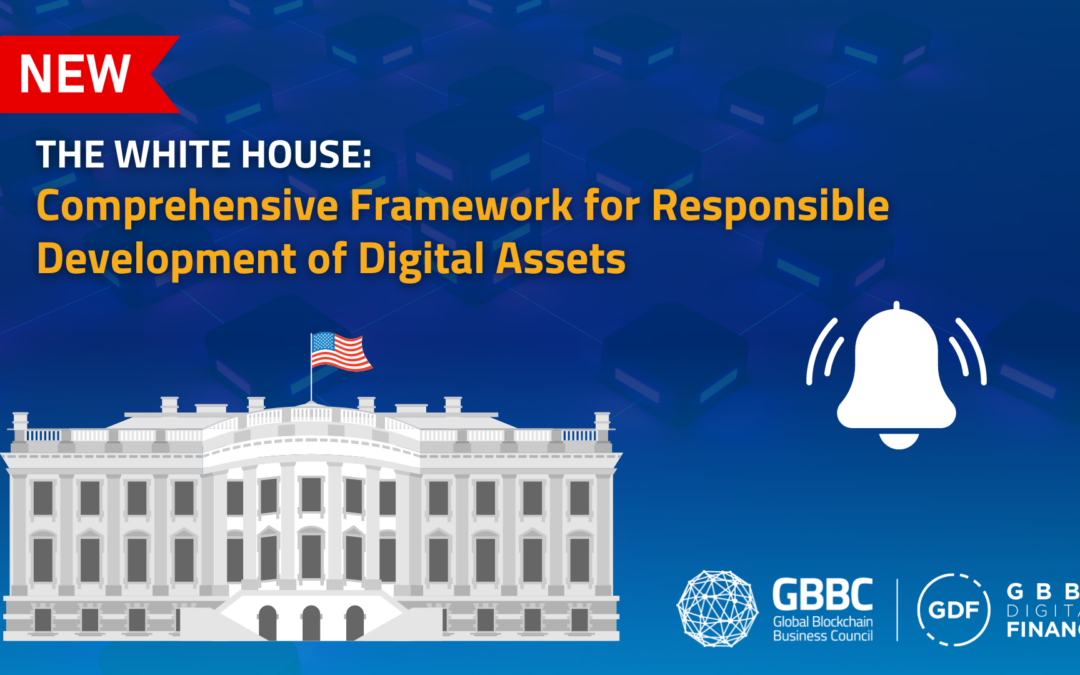The White House has released the Comprehensive Framework for Responsible Development of Digital Assets today. The framework follows President Joe Biden’s executive order requesting reports on recommendations to “protect consumers, investors, businesses, financial stability, national security, and the environment.” This represents a major milestone for blockchain and digital assets, as the U.S. government seeks to ensure that the country remains competitive and at the forefront of thought leadership in this burgeoning space. The order lays out several objectives and directives but does not go as far as to announce additional policies, regulations, or positions government agencies should take.
📣 Key Takeaways from the Framework:
CBDCs: The Administration calls for the creation of a Department of Treasury-led interagency working group to further support the Federal Reserve’s efforts on the creation of a central bank digital currency (CBDC)
Consumer Protection: Policymakers will focus on issuing guidance, increasing enforcement resources, increasing interagency collaboration, and aggressively pursuing fraudulent actors. The Securities and Exchange Commission (SEC), Commodity Futures Trading Commission (CFTC), Consumer Financial Protection Bureau (CFPB), Federal Trade Commission (FTC), and Financial Literacy Education Commission (FLEC) were specifically mentioned.
Prevention of Illicit Activity: The risks highlighted in the framework include money laundering, terrorist financing, risks to cyber security, market fragilities, a lack of common practices, and fast pace of change in the industry presenting vulnerabilities for misuse. President Biden will review necessary amendments to the Bank Secrecy Act (BSA), laws against insider trading, and laws against unlicensed money transmitting. The Fact Sheet specifically mentions the use of non-fungible tokens (NFT) for illicit activity and will consider raising penalties for unlicensed money transmitting. The Department of Treasury will enhance dialogue with private sector to complete their risk assessment of illicit financial activity in decentralized finance (DeFi) by the end of February 2023; and their assessment of NFTs by July 2023.
Financial Stability: The Fact Sheet calls for efforts to bolster financial institutions’ defenses against cyber vulnerabilities and to strengthen interagency collaboration on emerging strategic risks with U.S. allies, including the Organization of Economic and Commercial Development (OECD) and Financial Stability Board (FSB).
U.S. Global Competitiveness & Leadership: The U.S. will work with international organizations and standards setting bodies (including the G7, G20, OECD, FSB, Financial Action Task Force (FATF), and International Standards Organization (ISO)) to emphasize U.S. values related to digital assets and expand leadership roles on digital assets. The Department of Commerce will also focus on helping U.S. firms find a foothold in global markets.
Global Harmony: The Department of Justice will increase collaboration with partner agencies in foreign countries; The State Department, The Department of Treasury, and the United States Agency for International Development (USAID) will explore technical assistance to developing countries building out digital asset infrastructures and services.
Payments and Financial Inclusion: The Federal Reserve has planned the 2023 launch of FedNow, an instantaneous, 24/7 interbank clearing system for instant payments, which will run alongside the Clearinghouse’s Real Time Payments system. This will not necessarily be built on blockchain, but the report highlights the need to advance innovations that foster financial inclusion, as well as to create a framework to both regulate nonbank payment providers and encourage cross-border payments harmonization. The National Science Foundation (NSF) will conduct further research into socio-technical and behavioral economics.
Promoting Domestic Innovation: The Office of Science and Technology Policy (OSTP) and the NSF will develop a Digital Assets Research & Development Agenda. Treasury and financial regulators are encouraged to provide regulatory guidance, best practices, and technical assistance through tech sprints and other industry engagements.
Environment: The Department of Energy and the U.S. Environmental Protection Agency (EPA) will track and assess digital assets’ environmental impact. They will look to develop performance standards and provide local authorities with the required tools. The Department of Commerce will establish a standing forum to convene public and private sector stakeholders to exchange information, inform federal regulation and standards, and help coordinate efforts.
NEC Director Brian Deese shared in his statement, “Together, we are laying the groundwork for a thoughtful, comprehensive approach to mitigating digital assets’ acute risks and—where proven—harnessing their benefits. We remain committed to working with allies, partners, and the broader digital asset community to shape the future of this ecosystem.”
Read the official statement by the National Economic Council (NEC) Director, Brian Deese, and the National Security Advisor, Jake Sullivan: https://www.whitehouse.gov/briefing-room/statements-releases/2022/09/16/statement-by-nec-director-brian-deese-and-national-security-advisor-jake-sullivan-on-digital-assets-framework/
Read the White House Release of The Comprehensive Framework for Responsible Development of Digital Assets: https://www.whitehouse.gov/briefing-room/statements-releases/2022/09/16/fact-sheet-white-house-releases-first-ever-comprehensive-framework-for-responsible-development-of-digital-assets/
The Global Blockchain Business Council partnered with American University – Kogod School of Business at the Web3 Summit earlier this week in Washington, D.C., convening government and business leaders to learn more about the foundational concepts, essential benefits, and key risks of Web3 innovations from a perspective of policy and regulation. Interested in learning more about emerging technologies and the role that the Comprehensive Framework for Responsible Development of Digital Assets will play in the regulatory landscape in the coming months? Listen to the recordings from The Web3 Summit!

